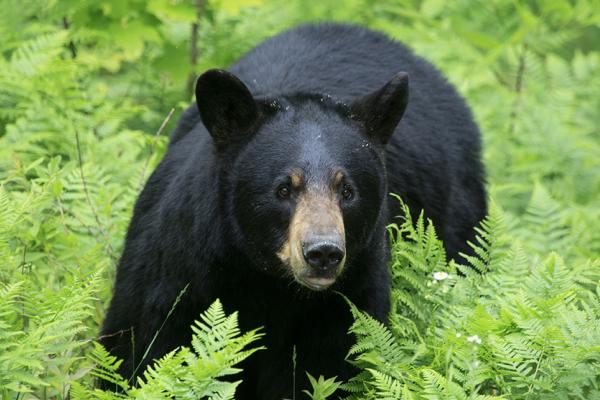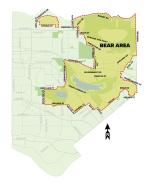Be bear aware
You can find bears in the city—especially in designated "bear areas" like Burnaby Mountain, Burnaby Lake, Deer Lake, Robert Burnaby Park and other parklands. The bear areas keep wildlife and our community safe.
But sometimes bears may enter our neighbourhoods looking for food. They are driven by hunger and can eat up to 20,000 calories a day. They also have a strong sense of smell and can trace food from several kilometres away. When bears get used to human food sources such as garbage, not only do they lose their fear of people, they endanger us, our pets and themselves.
You can help reduce the potential for conflict by securing your garbage and green bins and removing other attractants like pet food, bird feeders and ripe fruits from you property. Unintentionally feeding bears violates the Dangerous Wildlife Protection Act and setting out your waste bins too early violates the City’s Solid Waste and Recycling bylaw. Both are punishable offences.
View the designated bear area on BurnabyMap.
You can also view the designated bear areas in the map below. Click the map icon to see or download a larger view.
Map updated May 2022. Please note that there may be future changes to the designated bear area boundaries.
How to avoid human and bear interactions?
Garbage is the main attractant for bears entering residential areas. If you live within a bear area, you can take the following steps to avoid these interactions:
Single or two-family properties
- Set out waste bins between 5:30 am-7 am on collection day and remove waste bins by 8 pm.
- Securely store waste bins within your property on non-collection days.
Multi-family properties
- Set out waste bins between 5:30 am-7 am on collection day and remove waste bins the same day.
- Store garbage, yard waste, food scraps and recycling in bear-resistant bins or store all bins in a bear-resistant enclosure on the property.
Industrial, commercial and institutional properties
- Store all garbage, yard waste, food scraps and recycling in bear-resistant bins or store all bins in a bear-resistant enclosure on the property.
Questions and answers
Yes. While most bears go into a deep sleep or denning period, usually from November to April, some bears may not hibernate and still be present within the bear area.
The designated bear area boundary is based on bear sighting reports the City has collected.
Single and two-family properties and multi-family properties within the designated bear areas must set out their garbage, green bin and recycling no earlier than 5:30 am and no later than 7 am on collection day. This requirement does not apply to steel containers but the lids must be closed at all times.
These changes will help the City reduce human-bear interactions and stop bears from getting used to non-natural food sources, such as garbage or green waste.
It’s a fully enclosed structure of sufficient strength and design to prevent access by bears, like garages, sheds, fenced structures or enclosures.
- Rinse all blue box materials fully.
- Freeze any smelly foods and place them in your green bin on collection day.
- Compost correctly and avoid placing any potential attractants in your backyard composter.
- Pick ripe fruits and clean up any fallen fruits from your yard.
- Clean and empty the drip tray on your barbeque after each use.
- Remove bird feeders or suspend them on a cable.
- Feed pets and store pet food indoors.

